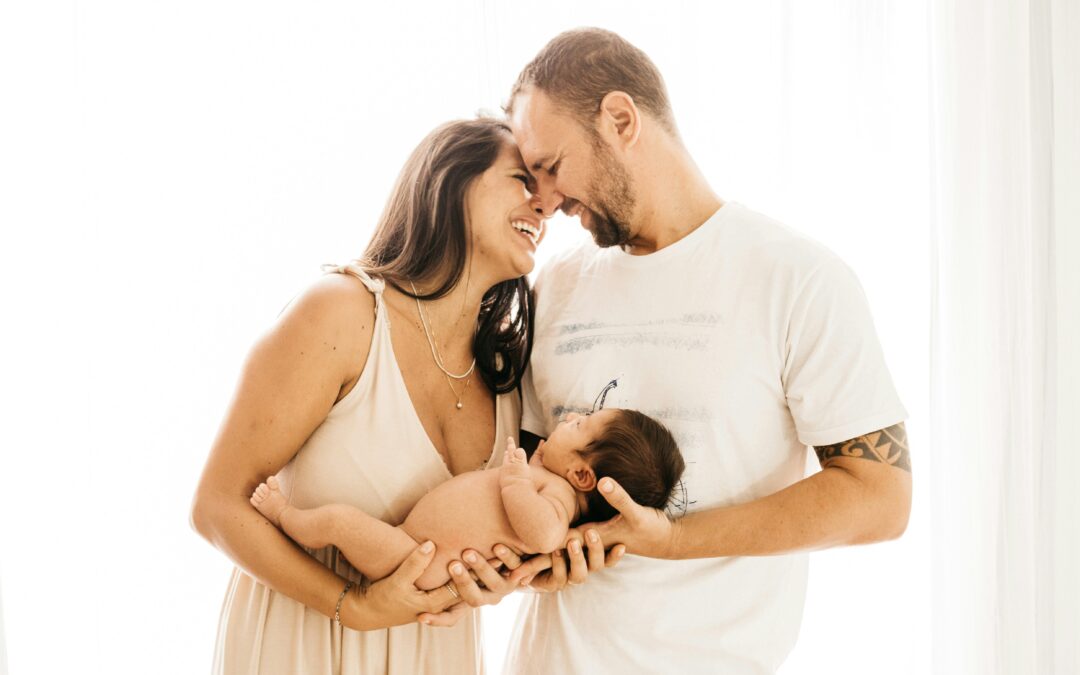In this guest post from Oregon Counselor Associate and Core Values Counseling team member, Josie Self, we explore what the Gottmans have to say about tending to your relationship once your little bundle arrives.
A baby changes everything
Bringing a baby home is one of the most transformational experiences a couple can have. Virtually every aspect of your relationship changes once that third little member of your family arrives — as cute as they may be.
Many couples experience drastic shifts in their relationship including increased conflict, decreased intimacy, less time together, less sleep, and new questions about goals and values which may not have seemed so important before.
Drs. John and Julie Gottman have completed extensive research on the changes that happen in a relationship when a baby is introduced. In this blog post, we’ll explore the ideas presented in the Gottmans’ book, And Baby Makes Three: The Six-Step Plan for Preserving Marital Intimacy and Rekindling Romance After Baby Arrives.
Today, we’ll cover steps one through three with some key points for each. For more detail on each, we highly recommend reading the Gottmans’ book.
Step one: “Realize we’re all in the same soup.”
It’s not just you. Really. In fact, it’s more common to have relationship issues after having a baby than to not. With help, your relationship will get better again.
Two-thirds of couples report relationship distress and a decrease in relationship satisfaction after children enter the picture.
As early as 1957, a landmark study by E. E. LeMasters claimed that an astounding 83 percent of new parents went through moderate to severe crises in the transition to parenthood.
Step two: “Delight in responding to your baby.”
Babies build secure attachments to their caregivers when those caregivers consistently respond to their needs. It’s about delight and engagement, not perfection. Connection is key.
Securely attached children are more independent, more resilient, better adjusted, and more inclined to explore the world.
Babies want to interact with us from the moment they’re born. In fact, humans are born pre-set to respond to each other.
Believe it or not, babies also imitate and replicate the internal experience of adults.
Step three: “Cool down your conflicts.”
Did you catch what we said about babies imitating and replicating the internal experience of adults? That’s a big one.
Babies absorb parental conflict and are profoundly impacted by fights. If you and your partner need to deal with conflict, it is best to have a problem-solving meeting time separate from your kids.
Of course, that’s not always possible in the real world. If you do argue in front of your children, they need to see you resolve your problems.
Slip-ups between you and your kids are also an inevitability. When they do happen, repair is essential. Babies must be held and soothed physiologically to reset their triggered nervous systems.
Here’s another interesting Gottman finding: fights during meal times lead to indigestion and increase the possibility of eating disorders in your kids.
Ways to cool down your conflict
If you’re thinking, easier said than done, here are some practical suggestions for turning down the temperature on your conflict:
- Soften how you bring up a problem. Use lots of “I” language, describe your experience, and ask for what you need.
- Accept influence. Look for ways to yield to your partner to get to “yes.”
- Calm yourself by self-soothing. Take responsibility for your own emotional flooding, and utilize grounding tools to regulate your physiological system before returning to conflict.
- Identify your core needs, and identify areas where you can be flexible. Couples successfully compromise when they are able to overlap their areas of flexibility and find a solution that meets both core needs.
- Don’t forget to repair. Every couple is going to experience conflict. Here’s the important thing: you need to be able to repair by understanding each others’ emotions, subjective experience, and areas of sensitivity — and collaborate with plans for the interaction or conversation to go better next time.
You’re not alone
Remember: relationship changes are to be expected, and if your relationship feels harder after your baby arrives, you can take comfort in knowing that you are in the majority. With some intentional work and time, your relationship will not only heal but flourish.
Stay tuned for part two of this post, including the last three steps from the Gottmans on how to preserve intimacy and rekindle romance post-baby.

